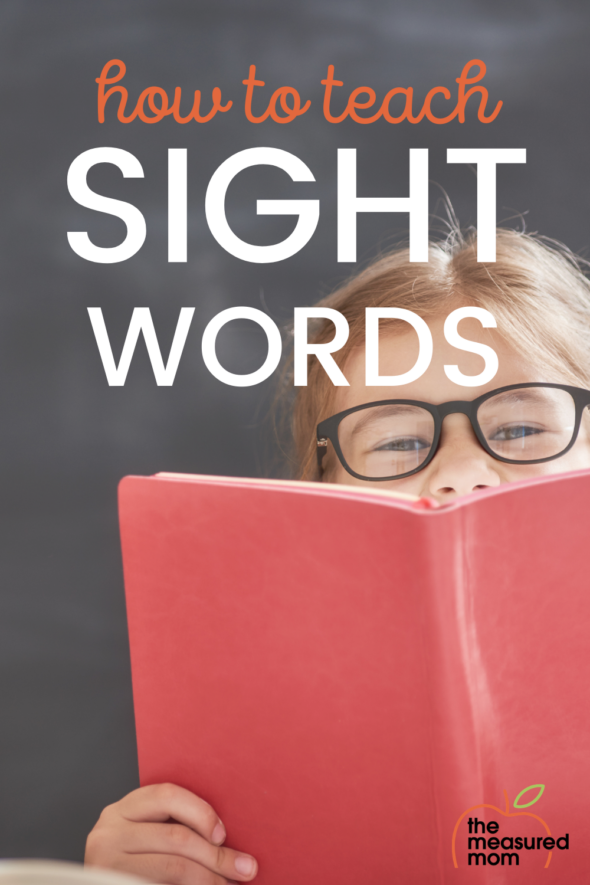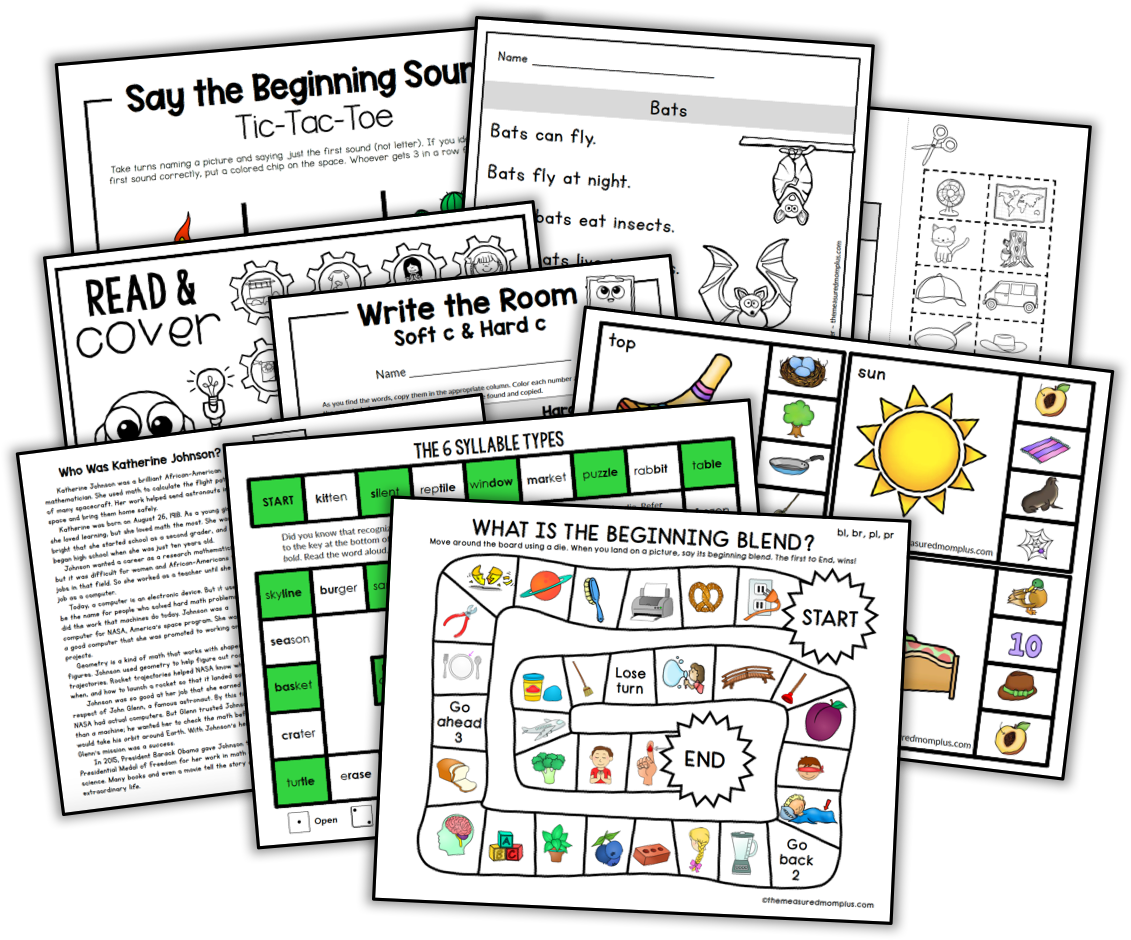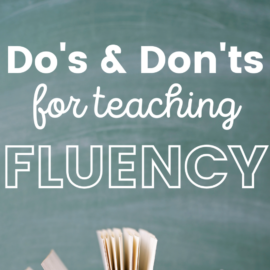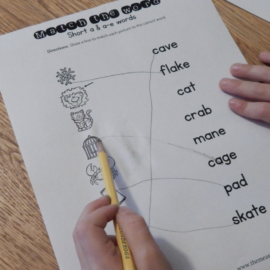I receive many emails from teachers and parents asking me how to teach sight words.
Areyouhere to learn how to teach high frequency words? You’re in the right place!

What are sight words?
Traditionally, when teachers say “sight words,” they are referring to high frequency words that children should know by sight.
We often define sight words as words that kids can’t sound out – words likethe, for example.
However, reading researchers have a different definition of sight words.
Asight wordis a word that is instantly and effortlessly recalled from memory, regardless of whether it is phonically regular or irregular. Asight-word vocabularyrefers to the pool of words a student can effortlessly recognize.
David A. Kilpatrick, PhD
So should we get lists of sight words and get our students to memorize them using flash cards?
Not so fast.
这doesn’t fit withhow the brain learns to read.
We are not trying to get students to cram pictures of words in their brains, because there’s a limit to how many words any of us can remember by sight.
How does the brain learn “sight words”?
Researchers have discovered that strong readers donotcall upon thousands of pictures of words in their brains. Instead, they (very, very quickly) connect the letters to the sounds in each word. They do this so quickly and effortlessly that it takes a tiny fraction of a second to identify each word.
How?
How do we move from sounding out words letter by letter, to recognizing thousands and thousands of words instantly?
It’s through a mental process called orthographic mapping.
Say what?
Stick with me … I promise it’s not as complicated as it sounds.
Orthographic mapping is the process we use to store printed words in long-term memory.
David A. Kilpatrick, PhD
In order for us to read wordsand then store them for future retrieval,我们必须能够匹配的音素(声音)to the graphemes (letters).
Does that sound familiar to you?
It’s phonemic awareness and phonics.
We need to teach children to identify individual sounds in words and then connect those sounds to letters. We teach them to sound out words,even sight words.
What about sight words that aren’t regular, likethe?
We call attention to the parts of the word thatarephonetic (and there’s usually at least 1-2 of them). Then we teach learners to learn the tricky partsby heart.
So what does this tell us about the big sight word lists … like Dolch and Fry?
I don’t think it’s wrong to teach kids to read words using those lists as a reference, but we need to approach it a different way.
We shouldn’t be sending home lists of 50 “sight words” for our kindergartners to master.
Instead, we should integrate those words into phonics lessons as often as possible.
For example, the Dolch primer list includes words like these:
on, at, did, that, ran
这些单词是完全可解码的,和风湿性关节炎ther than teach them by sight, we should teach kids toreadthem using their phonics knowledge.
When we give then opportunities to sound out the words when reading them, we are providing an environment for orthographic mapping to take place.
Is there ever room for teaching kids to memorize high frequency words?
Yes, but only a small amount (think 10-15 words), and only to make our students’ early reading material readable.
For example, a good decodable book (that actually sounds like a story) will need words likethe. You will need to teach early readers to recognize the wordthe. And yet you can STILL call attention to the “th,” which is not irregular at all.
How to introduce sight words
- Assuming your learner has phonemic awareness and letter-sound knowledge, you’re ready to begin. (Not sure about the phonemic awareness? Give thisfree assessment.)
- Name the new word, and have your learner repeat it.
- Name the individual phonemes(sounds) in the word. For example, in the wordis, there are two phonemes: /i/ and /z/.
- Spell the sounds. Call attention to any unexpected spelling. Inis, we spell /i/ with i and /z/ with s.
- If possible, have your learnerread related words.Hasandhisare great words to read alongsideisbecause they are short vowel words with ansthat represents the the /z/ sound.
- Have your learnerread connected text.Connected text can be decodable sentences or books.
Check out the rest of this series!
Part 1Part 2Part 3Part 4Part 5Part 6Part 7Part 8Part 9
More resources for learning about high frequency words
- Free lessons and decodable books for teaching high frequency words
- A new model for teaching high frequency words– Reading Rockets
- Heart Word Magic– Really Great Reading
- Teaching Every Reader(online course)
- Essentials of Assessing Preventing, and Overcoming Reading Difficulties, by David A. Kilpatrick






Kristen Cassidy
Oh no! Were all the links to the sight word worksheets removed?! ;(
Heather Groth, Customer Support
Hi Kristen! No need to worry, you can find all the free Sight Word Lessons and Books at this link,//www.sewedy-eg.com/free-sight-word-books/.
Olivia Rose
这is so great. I am going to use these with my daughter who struggles with spelling, not just sight words. This just might be the key for her. I am a big fan of your blogs and resources!
Heather Groth, Customer Support
Thank you, Olivia! We hope that they will be a big help for her!
Donald Knight
As usual, top notch information!
JENNIFER D WILSON
Thank you so much for the work you put into educating us as educators. I’m taking a LETRS class this year and everything is aligning nicely. I teach Reading to Kindergartners who are at risk. Out of my 29 years this has been the best year yet. Wish I had known all of this earlier in my career. I feel like I failed so many before. Thank you again. I am a fan of your blogs and podcasts and all things Reading.
Anna Geiger
I know what you mean … I regret many things, but I am also excited by all the ways there are to learn and improve. I hope to take LETRS training myself one day; I’m so glad to hear all is lining up!
Melanie
My son is working hard at becoming more independent with spelling. I was not taught phonics, and I was feeling stuck on explaining the words that we are commonly told they should just memorize. That doesn’t work for him! I appreciated seeing the example of similar words (is, his, has). Thinking of similar examples when we come to an usual word will be a huge help for us both. Thank you!
Anna Geiger
I’m so glad this was helpful, Melanie!
Summer Tigert
100% YES! Thank you for putting this out there! I am an assistant principal but was previously a special education teacher, specializing in reading intervention. This is 100% AMAZING! Especially for students who struggle with working memory and retrieval. It is vital to teach phonics skills and incorporate othrographic memory whenever you can, especially for struggling readers! Getting readers to visualize the word with strategies like “sky writing” (holding their finger in the air, visualizing the word, then writing the word correctly with their finger) can help the brain map the word correctly. We call the words “cheater words” because they “cheat” phonetically. The word “was” should be spelled “wuz” but it cheated That usually helps students feel better about not being able to sound out the word and makes it a little more fun.
Thanks for putting this out there for all
Summer
Anna Geiger
Thank you so very much for your feedback, Summer, and for that tip about cheater words! I love it!
Emma
I’ve seen and been following the latest things you post, plus following your podcasts about the science of reading. I am enjoying the new information. As soon as I saw this article, I clicked on it. I am SO happy to learn that this is what I have been doing!
我教英语的学生在不同的国家。这country has a completely different alphabet and letters, so the first thing I started with was the alphabet, but then I’ve also been incorporating Sight Words every week. I’ve taught the letters and each sound and my lower classes still do A LOT of work on these, so we sound out each of the sight words every week. Woohoo!! So glad to hear that I don’t have to change what I’m already doing.
Again, Anna, thanks for all your work, resources, information, worksheets, and everything you do. I appreciate it!
God bless you abundantly!
Anna Geiger
Thank you so much, Emma! I love to hear what you’re doing with your learners – great work!!
Barbara
Anna- This is wonderful! The ideas coordinate so well but I never thought to use as combined teaching. Thank you again for all you do!
Billie
Thanks so much for this info. I have twin grandsons and I try to introduce anything that might help with their attempt to learn how to read.
Kate Dowling
You’re welcome, Hemlata! So glad this is helpful!
Kate, Anna’s assistant
Bertha
Thanks so much for sharing I will use this to help my daughter who is 5 yr
Anna G
You’re welcome, Carrie ! :))
Anna G
这will vary for every teacher and the sight words they are required to teach. If you have a lot of freedom here, I would choose words that occur most frequently in their reading. Some people use the Dolch word list to help with this – another good option is to look at the Fry’s word list to see which words appear most in their reading.
Dawn
Ann
I need the worksheets for sight words / or primer sight words that you dot or color. I can’t get the old website to send them to my email.
I’m doing a major review these next couple of weeks
Thanks Dawn
Anna G
You can grab those for free in the subscriber library. Just check for the link and password at the bottom of a recent newsletter.
Tami Eager
I am so excited about this post! The Science of Reading is where it’s at! David Kilpatrick is the man, and you are right on target with all of this. I have seen so many education bloggers who have not switched over from leveled literacy, and not to say y’all have cult followings, but you do! Those who are not willing to make the change are misleading so many folks out there! Thank you for being open-minded and doing what’s right instead of what’s necessarily easy (because teaching SOR is not a cakewalk, especially with not a lot of resources out there!)
Anna Geiger
Thank you so much for your kind words, Tami! It is definitely a shift, to reconsider balanced literacy and change what wasn’t in line with the research. But surely exciting!
Anna G
No, probably not. For example, many kids can recognize words by sight just after seeing them all the time – like their names or the word STOP, but they may not know all their letters and sounds.
Anna G
No, I don’t have any editable sight word worksheets at this time.
Susan
Thank you so much for this idea. I’m going to try it out.
Anna Geiger
You’re very welcome, Susan!
Marwa
thanks alot , It’s really fun ,
Anna Geiger
You’re welcome, Marwa!
Kristina
这is fantastic. I am going to use it with my child that struggles with spelling, not just sight words. This just might be the key for her. Thanks for sharing.
Anna Geiger
I hope it works for you, Kristina!
Shirley Schwemm
I hope to use these, but from what I can tell, both sight word bonus worksheets are the same.
Anna Geiger
No, they are different. One is the preprimer list and one is the primer list.